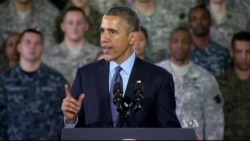2015 is here, and with a new year comes new challenges - and some old ones. Last year left the United States with a lot of unfinished business around the world. President Barack Obama's top foreign policy challenges as he enters his final two years in the White House will be varied and require careful coordination between many stakeholders.
In December, President Obama marked the end of America's longest war.
But Pentagon officials say the dawn of 2015 does not mean the end of U.S. assistance.
"It’s not like on December 31 we’re just going to walk away. We aren’t. We are going to remain," said Pentagon spokesman Rear Admiral John Kirby.
Air support, training and counterterrorism are all on the agenda for the more than 10,000 U.S. troops staying in Afghanistan this year.
It's help Afghan forces need, as the year saw a rise in Taliban attacks.
The U.S. will also fight terrorism in the form of Islamic State militants. The group surged into the public consciousness in 2014, with its rapid takeover of large parts of Iraq and Syria and its brutal beheadings of Westerners.
Airstrikes against the group appear to be working, with analysts predicting continued gains.
“I think Iraq, between the Kurdish army and the national army based in Baghdad, with strong U.S. support, will make progress in 2015,” said Paul Salem, of the Middle East Institute.
Also in need of progress are the efforts of the U.S. and five other world powers to reach a nuclear deal with Iran. Negotiators are now aiming for July, after a November deadline passed without agreement.
“These talks are not going to suddenly get easier just because we extend them. They're tough. And they have been tough. And they are going to stay tough,” said Secretary of State John Kerry.
And the new Republican-controlled U.S. Congress could complicate things even more, say analysts.
“Members of Congress are anxious to impose additional sanctions. That could have a disruptive effect,” said the Brookings Institution’s Robert Einhorn.
Russia is the source of even more sanctions tensions. Those the U.S. has imposed for Russian support of Ukrainian separatists have helped send Russia's currency and economy into a nosedive. But the Ukraine conflict is a dispute U.S. officials are determined to overcome.
“No one is giving up on the U.S. - Russia relationship. We have to get it to a better place,” said Eric Rubin, a Deputy Assistant Secretary of State for European and Eurasian affairs.
The U.S. says Russia could get sanctions relief by withdrawing all troops from Ukrainian territory, among other conditions.
And not to be forgotten is North Korea. U.S. investigators traced the November cyberattack on Sony Pictures Entertainment to the isolated nation. In response, President Obama made new sanctions against North Korea his first foreign policy move of the New Year.





